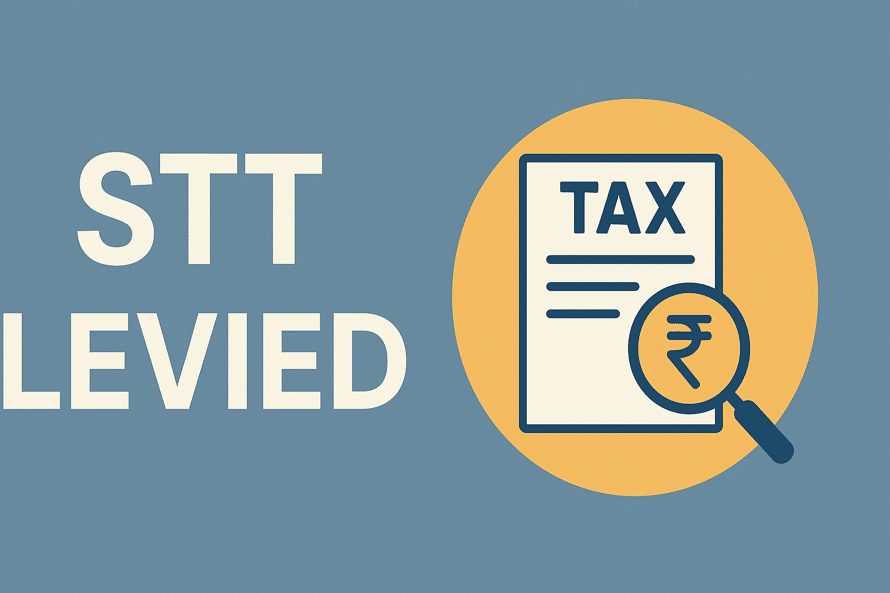How Securities Transaction Tax (STT) Is Levied in India: An Explainer

In India, STT (Securities Transaction Tax) is levied on buying and selling securities. It was introduced to ensure that capital market transactions are not subject to tax evasion. STT is charged for each transaction made on formal stock exchanges. Examples of this type are shares, derivatives, mutual funds, and others.
The rate of STT changes with every security and transaction type. Equity trades that involve delivery have a distinct fee from those made for intraday transactions and futures and options transactions. Investors should understand how the STT levied impacts their gains. Understanding STT rates is crucial for sound financial planning and making informed trading decisions.
What is Securities Transaction Tax (STT)?
STT is a tax you pay when you purchase or sell securities listed on any recognized Indian stock exchange. The market includes stocks, derivatives, equity mutual funds, and other traded instruments. The charge for STT is deducted right after purchase.
Origin and Legal Basis
The Government of India launched STT in 2004 to prevent investors from evading taxes in capital markets. Stock exchanges collect this tax and remit the funds to the central government. Securities Transaction Tax is regulated by the Securities Transaction Tax Act of 2004.
Purpose of STT in Market Regulation
STT promotes transparency when conducting financial transactions. It ensures that all investor trades are accurately captured. This makes the stock market more dependable. STT enables the government to watch trading activities and collect the required taxes.
If STT is collected right after the trade, the system makes it impossible for businesses to report wrong or false information. STT levied in India is to improve the Indian securities market’s efficiency, traceability, and fairness.
How STT is Calculated and Collected
Introduced in 2004, STT was implemented to curb excessive speculation in the markets and generate revenue for the government. The value of all transactions involving shares, derivatives, and equity-oriented mutual funds is subject to it on the recognized stock exchanges. Let’s understand how we calculate and obtain the necessary information for STT.
Transaction-Based Tax Structure
| Taxable securities transaction | Rate of STT |
| Delivery-based purchase of equity shares | 0.1% |
| Delivery-based sale of an equity share | 0.1% |
| Delivery-based sale of a unit of an oriented mutual fund | 0.001% |
| Sale of equity shares or units of equity-oriented mutual funds in a recognized stock exchange, otherwise than by actual delivery or transfer, and intra-day traded shares | 0.025% |
| Derivative – Sale of an option in securities. | 0.1% |
Who Collects STT and Where Does It Go
When a trade is executed, the stock exchanges collect the required Securities Transaction Tax (STT). After that, the money is sent to the Government of India. The broker will deduct the tax amount and display it on the contract documentation provided to the investor. STT levied on transactions of financial securities generates revenue for the government and streamlines trading processes for traders.
STT Rates by Transaction Type (as of October 2024)
STT applies to transactions involving stocks, futures, options, and the redemption of mutual funds on Indian stock exchanges, as per government regulations. The NSE announced that STT rates have been revised, effective October 1, 2024.
Equity Delivery Trades – 0.1% on Both Buy and Sell
When dealing with delivery-based equities, the Securities Transaction Tax (STT) is fixed at 0.1% for buying and selling orders made through a broker. Thus, both the buying and selling actions will be subject to taxes.
Equity Intraday – 0.025% Only on the Sell Side
In STT-based trading, traders are only charged on the sell side for a flat 0.025% or ₹25 on every ₹1 lakh sold. It reduces the amount of taxes traders must pay for their daily transactions.
Futures Contracts – 0.02% on Sell Side
In STT trading, there is no fee when you buy, but you pay a standard fee of 0.025% or ₹25 on each ₹1 lakh sold. Traders are subject to lower taxes for their daily transactions.
Options Trading – 0.1% on Premium for Sells; 0.125% on Exercise
The rate of implied volatility is calculated differently for options that fall under the two STT rates. A fee of 0.1% is charged on the premium for options purchased to be sold (short-selling options). 0.125% of the current intrinsic value is taken away when the option is exercised.
Equity Mutual Fund Redemptions – 0.001% on Sell Side
STT levied at a rate of 0.001% on the sell side when units of equity-oriented mutual funds are redeemed. The goal of these updated rates is to preserve investor compliance while expediting STT collection.
STT Application: Examples and Clarifications
STT is the tax charged for buying and selling securities that are traded on Indian stock markets. STT is a tax that is collected by stock exchanges. The rate varies according to the form of security and transaction being processed.
Example: STT on a ₹2,40,000 Equity Delivery Purchase
For transactions where you purchase shares worth ₹2,40,000 or more, the STT comes at a rate of 0.1%. That makes STT = ₹2,40,000 × 0.1% = ₹240. The amount is automatically added to what you pay for the instrument and is reflected in your contract note.
When STT Does Not Apply (e.g., Off-Market Trades)
The Securities Transaction Tax is not charged when shares are transferred to family members as a gift. Private deals that are not done on stock exchanges are not considered stock transactions. Trades made on stock exchanges are the ones on which STT is levied. Buying property off-market may result in capital gains tax, but no Securities Transaction Tax (STT) is payable.
STT Charges Reflected in Your Broker Contract Note
The broker’s contract note states that a Securities Transaction Tax (STT) fee is charged on every transaction. This makes it easier to check the taxes you paid and helps you file your taxes for capital gains. Understanding the rules for STT helps investors avoid doubts about their taxes and organize their trades more effectively.
Implications of STT for Traders and Investors
When you buy or sell securities listed on a stock exchange, the Securities Transaction Tax (STT) is applied. To simplify tax collection and prevent tax evasion, it was introduced. It raises the cost of trading slightly, but it ensures transparent stock market trading.
STT’s Role in Tax Reporting and Filing
For tax reporting purposes, the STT levied on transactions serves as evidence of investment or trade. With an investment fund, investors can determine whether their profit will be immediate or long-term. While filing business income, traders are allowed to use STT-paid records. During an audit, having STT makes it easy to check every record of trade.
Impact on Intraday and Derivative Strategies
STT significantly impacts intraday traders and individuals working in derivatives. It applies to the sale of shares in equity intraday trading. Stamp duty tax applies to the fee you pay when buying options and to the last part of the price you pay for futures settlements. The costs associated with execution may result in reduced net profits, particularly when employing high-frequency strategies. As a result, traders should consider STT when determining breakeven points.
Regulatory Transparency vs. Cost Consideration
STT enables the legal monitoring of all trades. At the same time, for those who trade in huge volumes, this extra transparency offers little benefit. The cost of trading in India is higher than in international markets.
Although STT incurs additional expenses, it ensures compliance and tax efficiency. Traders and investors should be aware of its impact to plan their finances well.
Conclusion
Understanding how STT is imposed will enable investors to become more compliant. Although it increases trading costs, the STT levied makes it transparent, accountable, and easier to report taxes. Therefore, investors may consider these rates and implement the best trading strategies.
FAQs
1. What is STT, and why is it charged?
STT is levied on the purchase and sale of securities listed on recognized stock exchanges. It is meant to generate revenue from securities trading.
2. Is STT applicable to mutual funds?
STT rate of 0.001% applies when an investor wants to redeem or sell a unit of an equity-oriented mutual fund. STT does not apply to debt or debt-oriented mutual funds.
3. Do I pay STT for both buying and selling stocks?
When you buy or sell equity delivery trades, you are charged with STT. When it comes to intraday trades, customers are required to pay Securities Transaction Tax (STT) only when selling, not when purchasing.
4. Is STT applicable to futures and options (F&O)?
STT is 0.01% for futures (sell side), 0.0625% for sold options, and 0.1% if options are exercised (buy side).
5. How is STT different from capital gains tax?
During every trade, STT is applied and paid by the traders. While filing your income taxes, you have to pay capital gains tax on profits you earn, depending on how long you hold your assets.
6. Are STT charges refundable or deductible?
Unfortunately, Securities Transaction Tax (STT) is not refundable. It is a tax paid on transactions and cannot be reclaimed, even if it results in a loss.
7. Does STT apply to off-market share transfers?
STT does not apply to transactions done outside of recognized stock exchanges. It only concerns trades that take place in the stock market, not those done privately.
8. Where can I see STT charges in my broker statement?
STT charges are usually labeled as “taxes” or “charges” in both the contract and trade summary you get from your broker. It is generally included in the cost per purchase along with other applicable fees.
Disclaimer
The stocks mentioned in this article are not recommendations. Please conduct your own research and due diligence before investing. Investment in securities market are subject to market risks, read all the related documents carefully before investing. Please read the Risk Disclosure documents carefully before investing in Equity Shares, Derivatives, Mutual fund, and/or other instruments traded on the Stock Exchanges. As investments are subject to market risks and price fluctuation risk, there is no assurance or guarantee that the investment objectives shall be achieved. Lemonn (Formerly known as NU Investors Technologies Pvt. Ltd) do not guarantee any assured returns on any investments. Past performance of securities/instruments is not indicative of their future performance.







